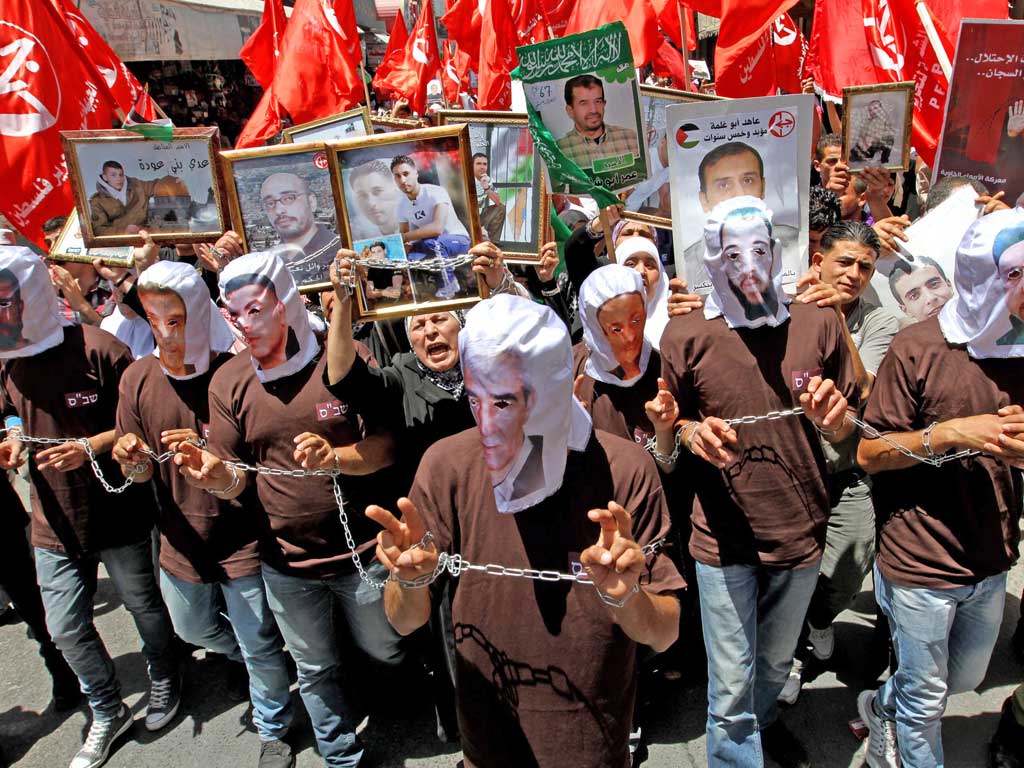Tony Blair urges Israel to keep hunger strikers alive
Peace envoy warns of tragic outcome if Palestinian protesters were to die in prison

Your support helps us to tell the story
From reproductive rights to climate change to Big Tech, The Independent is on the ground when the story is developing. Whether it's investigating the financials of Elon Musk's pro-Trump PAC or producing our latest documentary, 'The A Word', which shines a light on the American women fighting for reproductive rights, we know how important it is to parse out the facts from the messaging.
At such a critical moment in US history, we need reporters on the ground. Your donation allows us to keep sending journalists to speak to both sides of the story.
The Independent is trusted by Americans across the entire political spectrum. And unlike many other quality news outlets, we choose not to lock Americans out of our reporting and analysis with paywalls. We believe quality journalism should be available to everyone, paid for by those who can afford it.
Your support makes all the difference.Tony Blair has stepped into the crisis triggered by a mass hunger strike of Palestinian prisoners, pressing Israel to take steps to prevent the "tragic" outcome of any of them dying.
Palestinian demonstrations in support of the strikes were stepped up at the weekend amid efforts, led by Egypt, to reach an agreement in time to avoid further endangering the lives of two prisoners who have both refused food for more than 75 days.
Israel's prison service said yesterday that 1,550 inmates were on hunger strike, while protest organisers say 2,500 are taking part to press their demands for an end to Israel's practice of "administrative detention" without trial and for improvements in prison conditions.
Mr Blair, who was named the envoy of the quartet of Middle East peace negotiators after stepping down as British prime minister, said he was "increasingly concerned about the deteriorating health conditions of the hunger strikers" and that over the past week he had "engaged Israeli official at all levels to take all necessary measures to prevent a tragic outcome that could have serious implications for stability and security conditions on the ground".
He added that he had urged the Israelis to "respect the human rights of all prisoners and to provide them with all necessary medical assistance and legal recourse to due process".
The two prisoners whose health is giving rise to most concern are Tha'er Halaleh and Bilal Diab, administrative detainees who Israel says are members of the militant Islamic Jihad faction. The prisons department said yesterday that both were currently in its medical centre at Ramle prison, but would be transferred to a civilian hospital if needed. The condition of at least four other prisoners is said to be serious.
Palestinian President Mahmoud Abbas has described the situation as "extremely dangerous" and that it would be a "disaster" if one of the hunger strikers died. Amid fears of a backlash in the West Bank, Mr Abbas has personally raised the issue with both the Israeli Prime Minister Benjamin Netanyahu's senior aide, Yitzhak Molcho, and the US Secretary of State Hillary Clinton. Last week, he said no one would be able to "control the situation" if one of the hunger strikers died.
Administrative detention dates back to the British mandate and allows a military judge to order detention up to six months, with the sentence indefinitely renewable, on the basis of secret evidence and without charge or trial.
The hunger strikers are also seeking an end to the widespread use of solitary confinement, to a long-standing ban on relatives' visits to prisoners from Gaza, and to arbitrary strip searching and night raids on cells. The prisons department said yesterday that solitary confinement had been ended for two prisoners, including Mahmoud Issa, who has been held under those conditions for ten years. Authorities are reported to have yielded to another demand: an end to a ban on books and academic materials imposed after the 2006 seizure of the now freed Israeli Army sergeant Gilad Shalit.
At a protest by about 150 people in central Ramallah yesterday, one demonstrator, Lamees Abed Al Jaleel, 23, an IT technician, said she had fasted in solidarity with the prisoners for five days. She added: "I'm really hungry, really tired, and I have been taking water and occasionally a few olives. So what can it be like after 75 days?"
Join our commenting forum
Join thought-provoking conversations, follow other Independent readers and see their replies
Comments